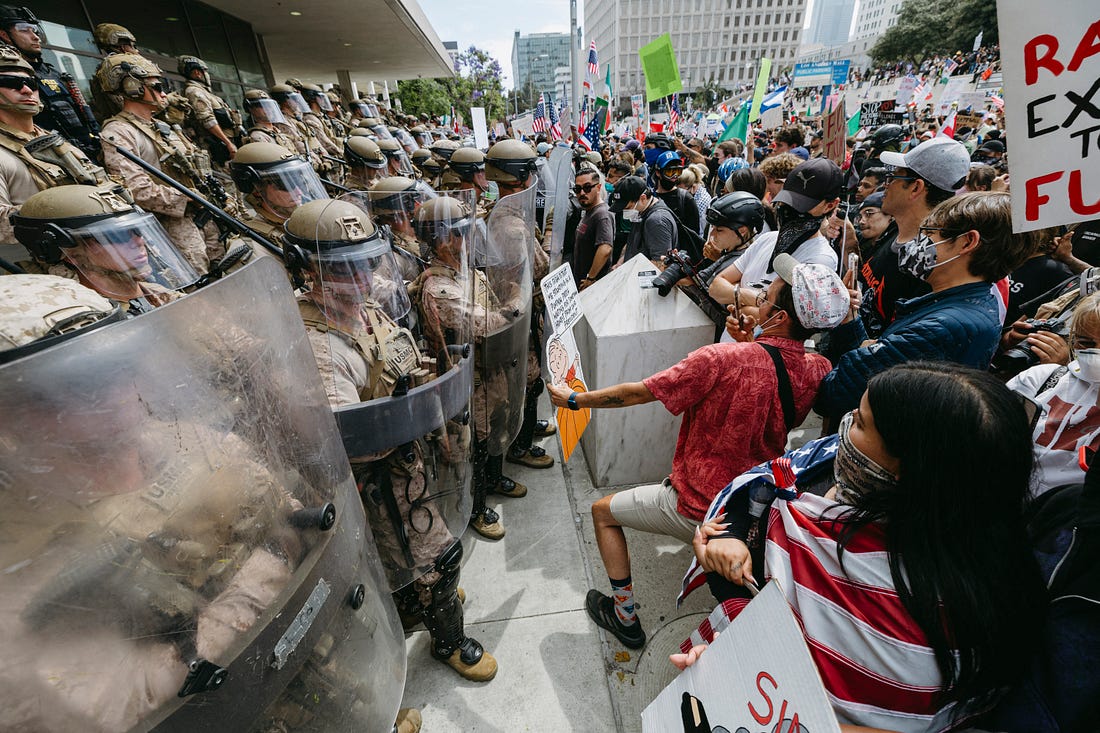|
 |
Trump’s Guilt-By-Association Law Enforcement
The groundwork has been laid to go after innocent people, opposition groups, and even No Kings protesters.
Some unbelievable scenes out of Israel this morning, where the last hostages held by Hamas have just been returned as part of the preliminary ceasefire deal in Gaza. Negotiating hurdles remain, but leaders are projecting optimism: “The war is over,” Donald Trump said from Air Force One yesterday, as he took off bound for Israel. Addressing the Knesset on Monday morning, he declared a “historic dawn of a new Middle East.”
“This is not only the end of a war, it is the end of an age of terror and death, and the beginning of the age of faith, hope, and of God.”
Let’s hope. Let’s hope he’s right that the situation will now “normalize.” But let’s be clear-eyed, too. That won’t happen overnight; the path ahead remains enormously challenging. For today, though, it’s enough to be grateful: The bombs are stopping, and the hostages are home. Happy Monday.
 |
Have You Seen This Domestic Terrorist?
by Andrew Egger
When it comes to slowly tightening a lawless grip on a people, one of the authoritarian’s most potent tools is guilt by association. The bedrock idea that force of state is justified only against those persons who have committed specific illegal acts is abandoned, replaced by the idea that force can permissibly be deployed against certain kinds of people. The vaguer the definitions involved, the more room the authoritarian has to maneuver.
This year, the Trump White House has gone to some pains to habituate the American people to guilt-by-association enforcement. They’ve tried to deport migrants with no due process based merely on the accusation that they were gang members—an accusation based, in some cases, on no more than the migrant’s clothing and tattoos. They’ve sent masked plainclothes agents in unmarked vans to arrest international students they claim are terrorist sympathizers—which might mean no more than they publicly criticized Israel. And lately, they’ve been laying the groundwork to exercise similar tactics against American citizens. The White House has used the label “domestic terror” to describe a vast swath of anti-Trump protest and organization, from Antifa protesters to left-wing NGOs.
“With God as my witness, we are going to use every resource we have at the Department of Justice, Homeland Security and throughout this government to identify, disrupt, dismantle and destroy these networks and make America safe again for the American people,” Stephen Miller said last month.
So the question now is: Who counts under Miller’s definition? How broad a brush does the administration intend to use amid this promised crackdown? Some recent comments from Republican lawmakers suggest they’re prepared to go further than you’d think.
On Friday, both House Speaker Mike Johnson and his top deputy, Rep. Tom Emmer, made some eyebrow-raising comments about a forthcoming protest in D.C. This protest, Johnson said, would be a “hate America rally” run by “the pro-Hamas wing and Antifa people.” Standing next to Johnson a few hours later, Emmer sneered about “the terrorist wing of [the Democratic] party, which is set to hold a hate-America rally in D.C. next week.”
What protest were Johnson and Emmer referring to? The second “No Kings” protest, scheduled to take place on October 18.
If you followed (or participated in) the first “No Kings” event back in June, you might already be laughing. That protest, which was planned by a coalition of normie liberal groups and which attracted millions of people across dozens of cities, was almost comedically star-spangled in its affect and remarkably peaceful in its execution. One vignette to give you an idea: In Chattanooga, Tennessee, rally speakers dressed like 1776 colonists, solicited rounds of applause for the military veterans in the crowd, and encouraged rallygoers to be “the most boring protesters ever.” Organizers took deliberate measures to ensure no violence would break out around their protests and, with genuinely minimal exception given the size and scale, they were successful.
Now No Kings is happening again, and this is how Republicans are talking about it.
But it’s not merely grossly unfair. These days, after all, accusations like “terrorist wing,” “pro-Hamas,” and “Antifa” aren’t just insults. They’re talismans—phrases that unlock, in the view of the administration, a permission structure for the deployment of state violence. The largest, most organized, peaceful protest movement of the Trump 2.0 Resistance is coming back this week—and Republicans are talking as if they’re prepared to unleash the might of their increasingly politicized federal law enforcement (and, perhaps, accompanying military?) on it.
This isn’t to say, of course, that a state crackdown on No Kings 2 is guaranteed to take place. Even Donald Trump and Stephen Miller might flinch from the headlines that would result from their militarized cops cracking heads in a peaceful crowd flying American flags. That’s no way to win a Nobel Peace Prize!
The point, though, is that they’re keeping their options open. It may be better to put down protest through fear than through action—but either works. In the rhetoric of today’s Republicans, a No Kings protester is functionally equivalent to a domestic terrorist. That gives them all the room to maneuver they might need.